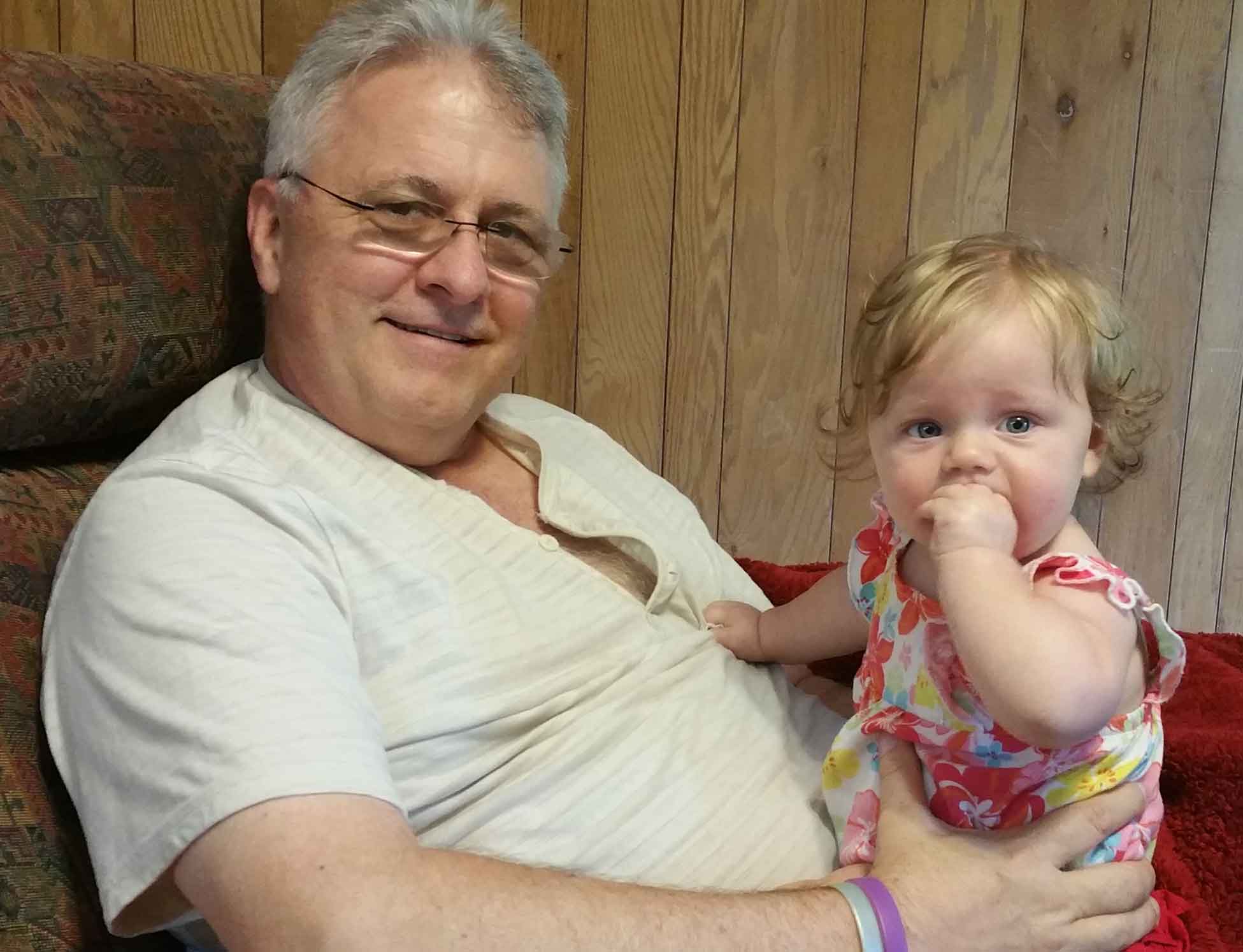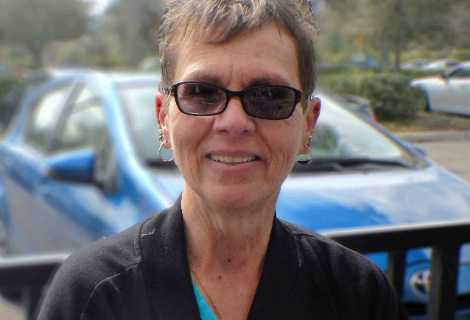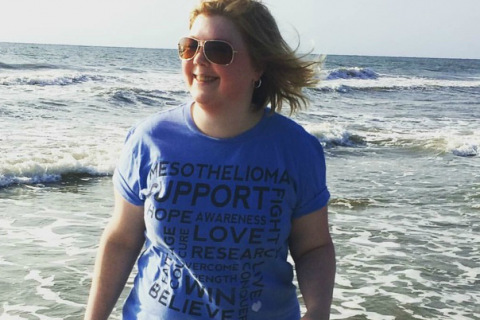Mesothelioma Survivor, Navy Veteran Triumphs Over Cancer

Fact Checked | Written by: Tim Povtak | Last Update: 10/25/2024 | 6 Min Read
Mesothelioma survivor Jim Madaris doesn’t worry about tomorrow anymore.
He is too busy enjoying today, savoring triumphs large and small.
He already has won this fight.
Madaris is still standing after undergoing an extensive 14-hour abdominal surgery and HIPEC procedure for peritoneal mesothelioma when he was diagnosed in 2013. A few years later, tumors emerged and his mesothelioma doctors removed the lining around one lung during a nine-hour pleurectomy/decortication.
He bent but never broke.
“When I look back, I have to say overall that life has been pretty great since I was diagnosed,” the 59-year-old said recently from his home near Fort Walton Beach, Florida. “I’m fortunate. I’ve lasted four times longer than my first doctor expected. I’ve seen three more grandchildren born, which is awesome. I saw my youngest child graduate from high school, and I’ve met a lot of great people. Even if something happens tomorrow, we’re still calling it a victory.”
Madaris is a former U.S. Navy pilot who served 14 years in the military before joining United Airlines and later Alfa Insurance, where he served as a vice president for project management.
Kidney Stones Sparked His Diagnosis
His diagnosis came almost by accident, sparked by a routine scan for kidney stones that looked out of the ordinary. More scans led to more tests and eventually to peritoneal mesothelioma.
“If it’s possible a kidney stone can be a blessing, it was for me because we caught this earlier than they would have,” he said. “But the first oncologist I saw was like ‘Sorry, dude. You’ve got 12 months to live. We’ll keep you comfortable.’ It was devastating at the time. I’m a realist, but I wasn’t ready to just sit there waiting to die at age 55.”
He credits his success battling mesothelioma and prolonged life expectancy to the University of Pittsburgh Cancer Institute, a top mesothelioma specialty center for both surgeries, and the Sarah Cannon Research Institute in Nashville, where he enrolled in two different immunotherapy clinical trials.
Going Beyond Standard Mesothelioma Treatment
“It’s important to find a specialist you trust, but no one has all the answers, and no one is going to be as interested in your care as you are,” he said. “Be your own advocate. The cancer doesn’t respond well to standard treatment, so you have to find someone who goes beyond standard and is interested in experimental drugs. Someone not afraid to try something new.”
His first surgery involved removal of his spleen, gall bladder, parts of his colon, several inches of his intestines, and his omentum, the fatty tissue that insulates the abdominal organs — all in search of mesothelioma tumor cells.
He spent three weeks in the intensive care unit and another three weeks hospitalized before returning home to start a chemotherapy regimen.
“I had a lot of stuff taken out that I thought you needed, but you really don’t,” he said. “The darn surgery nearly killed me, although now if you saw me, you’d just think I was a classically out of shape 59-year-old.”
After two months, Madaris returned to work at Alfa, which accommodated his less than 100 percent condition and made generous exceptions to keep him working. He arrived late to work. He took short naps during the day. He got special parking near his office door.
“They probably thought I wasn’t going to be around very long with this disease and really tried to help, giving me all kinds of perks,” he said. “For that, I was grateful, but eventually I felt like I was defrauding them, not doing the job I was supposed to do, so I took a medical retirement.”
The second surgery followed repeated fluid buildup around his lungs after the tumor cells migrated into the thoracic cavity. Doctors first tried a thoracentesis to drain the fluid, and then a pleurodesis to eliminate the space between the lungs and the chest wall.

Gain access to top mesothelioma doctors and get help scheduling appointments.
Connect NowCancer Survivor Finds Joy in the Little Things
Another major surgery followed in May 2015, but he recovered quicker than the first time. He goes for regular CT scans to check on any recurrence, but still leads a pretty normal life of a retiree, just moving a little slower than he would like.
“The things that matter to me have changed…the little things. However high you climbed or didn’t climb on the corporate ladder doesn’t mean anything,” he said. “When I grieved, the only things I grieved about were the times I failed to spend with loved ones.”
He spent two days recently happily cleaning out his garage. He and wife, Sandi, drove six hours to see his daughter at college. They are hands-on babysitters. They relish each moment, creating memories each day.
“If you look at the big picture and the big challenges that lie ahead, it’s not a lot of fun. So I don’t do that,” he said. “I look at today, and that day’s outlook is always great. I love sitting on the front porch with my wife, having a fresh cup of coffee. I love when my daughter is home from college. My grandkids are doing well. What’s not to like?”
Spreading Faith, Comfort and Support for Mesothelioma
The Christian book, “Don’t Waste Your Cancer,” written by theologian John Piper, especially touched Madaris. The book, which he received as a gift, makes it easier for him to reach out and help others in need.
“The point is, you have an opportunity with this to be a comfort or minister to others,” he said. “Here is an opportunity you’ve been given — it’s never one you would want — but still an opportunity to spread the word. I’m a person of faith, a Christian, but whatever faith you have, grab hold of it quickly. It will help you tremendously.”
A family-church support group provided Madaris invaluable help. They don’t talk much about mesothelioma, and he doesn’t want the topic dominating his life or his family’s life until it does.
“I’ve always said, hey guys, I don’t have cancer every day. I know I do, but I’m not dealing with it every day, so how about we live life without cancer until we have to do otherwise,” he said. “I’ll let them know when things get bad, and they’ll be champs when it’s time.”
He and Sandi are planning a move in August to the Phoenix area, where they hope to improve his mesothelioma prognosis by consolidating his care with a nearby cancer specialist known for his innovative thinking.
“I’m fine, blessed with good health now,” he said. “But I realize at some point, between now and heaven, that’s going to change. We just feel like moving out there will be the right place to be.”





